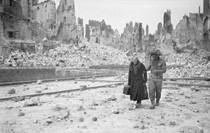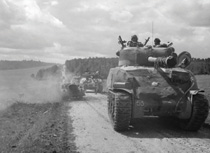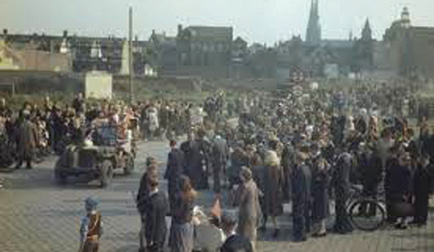|
Occupied People
by Brian Wilson CBE
formerly Irish Guards
|
For most of us, the Second World War is a distant affair that took place over 70 years ago in the latter part of the first half of the last century. Much of the present world population had not been born then. For those of us serving in 1944 in Normandy, Belgium, and Holland, our contacts with the local population were spasmodic and accidental. It’s sad to reflect that more French civilians were apparently killed in the bombardments over the period of the D-Day landings than the number of Allied servicemen who died there.
As the fighting in July/August 1944 moved beyond the Normandy beaches into the rural bocage country of farms, fields, and hedges, the population wisely fled to quieter parts, returning after fighting to repair damage and round up remaining stock and animals. In those days, out of doors, Norman men all wore dark blue overalls, a beret, and wooden sabots. Women wore a black dress that ran from wrist to ankle, and black stockings.
 A British soldier escorts a civilian in Caen, July 1944 A British soldier escorts a civilian in Caen, July 1944 |
 An Irish Guards Sherman Firefly medium tank. 31st August 1944 An Irish Guards Sherman Firefly medium tank. 31st August 1944 |
Behind the line but within possible shelling range, my platoon always lived in slit trenches and was perpetually hungry. This meant helping themselves from nearby plots to any potatoes, tomatoes, or vegetables, and to cooking utensils from the vacant farmhouse. In one position, the farmer’s family returned, and his adult daughter used periodically to enter our positions, giving rise to the sentry shouting ‘Watch your kit, boys’ as the girl rummaged round slit trenches, retrieving pots and pans etc. It was all good-natured fun, with cries of woe from the Guardsmen and smiles from the girl. She spoke no English and the Guardsmen no French. To avoid sitting on the ground amid heaps of earth, I had helped myself to a chair; it too was snatched away. Before leaving a position, we always tidied up and backfilled slit trenches. We tried to be friendly allies, not foreign occupiers.
In Belgium, as the Guards Armoured Division raced towards Holland, the 3rd Battalion Irish Guards (lorried infantry) sat in soft-skinned troop-carrying vehicles in daylong advances behind the armoured cars of the Household Cavalry and our own Irish Guards tanks. Much of the German transport in those days was horse drawn. This often meant our passing dead horses and upset wagons on the side of the road. At one point, a group of Belgian women with butcher’s knives were carving steaks from a dead horse. For a population starved during years of German occupation, the chance to acquire free horse meat was a welcome prize. At another point, we passed a lady leading a huge dog towing a small shopping trolley. I had not realised that this was a common pre-war practice.
When we entered Eindhoven on 18th September 1944 (during Operation MARKET GARDEN), the streets were lined with Dutch civilians delirious with joy. My platoon sitting on the tops of Sherman tanks crawled forward in a slow procession, accompanied by the shouting and yelling of the crowds. None of us had realised what relief we brought to a Dutch population that had suffered years of hunger and oppression during the German occupation. A pretty girl held out a hand to me, so I leant forward to touch it but lost my balance as the tank turned a corner and I started to fall off. Willing hands pushed me back. I never got to touch her hand.
 The liberation of Eindhoven, 18th September 1944 The liberation of Eindhoven, 18th September 1944 |
On a regimental post-war commemorative visit to Eindhoven, a city dignitary spoke of the days in 1944 when, as a youngster, he and other hungry lads used to hang around the cookhouse of the Irish Guards where the cooks would give them food. He said that for the first time in his life he tasted chocolate and rice.
Approaching Nijmegen on the way to Arnhem, the convoy was halted whilst the Grenadiers and American paratroopers battled to take the town. My platoon was positioned near a house occupied by a Dutch family. A stout matron with a charming smile bade me welcome, with three small bashful children round her feet. When I commented on them, the lady presented all nine of her children. Then her husband was brought forward; he was one of 19 children. Lastly, grandmother appeared, proud of her 84 grandchildren. The platoon reckoned that it was high time for bromide in the tea.
|
|

 A British soldier escorts a civilian in Caen, July 1944
A British soldier escorts a civilian in Caen, July 1944 An Irish Guards Sherman Firefly medium tank. 31st August 1944
An Irish Guards Sherman Firefly medium tank. 31st August 1944 The liberation of Eindhoven, 18th September 1944
The liberation of Eindhoven, 18th September 1944